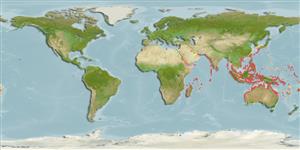Common names from other countries
>
Anguilliformes (Eels and morays) >
Muraenidae (Moray eels) > Muraeninae
Etymology: Gymnothorax: Greek, gymnos = naked + Greek, thorax, -akos = breast (Ref. 45335).
More on author: Bleeker.
Environment: milieu / climate zone / depth range / distribution range
Ecologia
marinhas associadas(os) a recifes; intervalo de profundidade 1 - 20 m (Ref. 90102). Tropical
Indo-West Pacific: East Africa to the Marshall Islands, north to the Ryukyu Islands, south to Australia. Likely to occur in Seychelles (Ref. 1623).
Length at first maturity / Tamanho / Peso / Idade
Maturity: Lm ?, range 44 - ? cm
Max length : 80.0 cm TL macho/indeterminado; (Ref. 1602)
Espinhos dorsais (total): 0; Raios dorsais moles (total): 0; Espinhos anais 0; Raios anais moles: 0; Vértebras: 134 - 145. Chestnut brown species that becomes darker posteriorly. Differs from the uniformly brown G. pindae by lacking the fine serrations on the posterior edges of the lower jaw teeth and by having a mouth that may not quite close completely.
Inhabits relatively turbid areas of sheltered lagoon reefs (Ref. 1602, 37816). Including mangroves in 1-20 m (Ref 90102).
Life cycle and mating behavior
Maturidade | Reprodução | Desova | Ovos | Fecundidade | Larvas
Myers, R.F., 1991. Micronesian reef fishes. Second Ed. Coral Graphics, Barrigada, Guam. 298 p. (Ref. 1602)
Categoria na Lista Vermelha da IUCN (Ref. 130435)
CITES (Ref. 128078)
Not Evaluated
Ameaça para o homem
Harmless
Utilização humana
Mais informação
ReferênciasAquaculturaPerfil para aquaculturaEstirpesGenéticaElectrophoresesHereditariedadeDoençasProcessamentoMass conversion
ColaboradoresFotografiasStamps, Coins Misc.SonsCiguateraVelocidadeTipo de nataçãoÁrea branquialOutras referênciasCérebrosVisão
Ferramentas
Relatórios especiais
Descarregue XML
Fontes da internet
Estimates based on models
Preferred temperature (Ref.
115969): 24.4 - 29.3, mean 28.4 (based on 3191 cells).
Phylogenetic diversity index (Ref.
82804): PD
50 = 0.5000 [Uniqueness, from 0.5 = low to 2.0 = high].
Bayesian length-weight: a=0.00047 (0.00025 - 0.00089), b=3.28 (3.13 - 3.43), in cm Total Length, based on LWR estimates for this Genus-body shape (Ref.
93245).
Nível Trófico (Ref.
69278): 4.0 ±0.6 se; based on size and trophs of closest relatives
Resiliência (Ref.
120179): Baixo, tempo mínimo de duplicação da população 4,5 - 14 anos (Preliminary K or Fecundity.).
Fishing Vulnerability (Ref.
59153): Moderate to high vulnerability (52 of 100).
